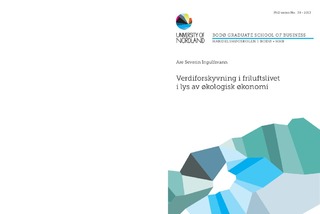| dc.description.abstract | Nature, culture and economy are considered to be sectors with different values.
This thesis examines how an activity, the traditional Norwegian outdoor life – friluftsliv, which can be seen as a cultural activity performed in nature, is influenced by values from economical sector.
The culture of friluftsliv has historically been built on the values of simplicity, respect for nature’s intrinsic value and avoidance of facilitation. These values are according to several authors threatened, and their critic is mainly aimed towards the influence of consumer culture and other factors linked to economical sector. The main idea behind the thesis is to examine if this actually happens, and how it affects friluftsliv.
The problem statement for the thesis is therefore: Do economical values influence friluftsliv through a displacement of nature and cultures value sectors? If so, how does this change friluftsliv? How can economical sector be formed to harmonize with the other sectors?
The problem statement is divided into 5 research questions. Question one is examining how nature, culture and economy is interpreted differently in neoclassical economics and ecological economics.
Question two introduces the term value displacement, and describes the process where values in an activity are displaced by an outer pressure. This does not mean that an activity is expected to be static, but that change is supposed to happen within the activity as an improvement. Therefore, a value displacement can be divided into two. It can be a result of absent knowledge over which values an activity is built on, or a lack of connection between the values participants in an activity support and how they act in the activity. The first can be named value displacement in the consciousness, and the second value displacement in practice.
Question three builds on the description of value displacement in question two and identifies the core values in friluftsliv both from a theoretical, historical perspective and from an empirical perspective. The values in both perspectives are similar. The participants in the activity today express the same values as one finds in the historical sources. This means that there are few signs indicating that there is a value displacement in the consciousness. Traditional values are still important and part of the values most of the participants consider as important. The picture changes when the participants describe their practice, what they actually do and with what means. There are quite many signs that the ideas of frugality and simplicity are displaced by an ordinary consumer culture, indicating a displacement in practice. This affects friluftsliv in different ways. The experience of nature yields for the experience of advanced activities, replacement of equipment is the preferable solution to master instead of training and replacement of equipment is based on fashion and not needs.
The fourth question looks at how nature is used and whether it is still used with the intrinsic value in mind. There is few signs indicating that there is a displacement of values her. Most of the participants in the interviews are very clear on how nature should be treated.
The findings, especially in question three, indicate that there is a challenge to live after the values one associates with friluftsliv. This is related to how the economical sector is functioning. The fifth question discusses and suggests alternatives for the cooperation between economy, nature and culture, with the aim of higher quality of life and a more sustainable development. The main argument here is that a change has to start with the individual – which must be more conscious on the connection between values and action. The economical sector must change from a neoclassical way of thinking into an ecological economics way of thinking.
The conclusion is that the economical sector is influencing friluftsliv through a displacement of values. This changes friluftsliv from being an activity almost without material values to an ordinary consumer culture. Consumption is presented as a solution and there is competition amongst participants to have the best equipment. This can be stopped through a change in how we think, and through a change from the neoclassical way of thinking into the ecological economics way of thinking. | |
